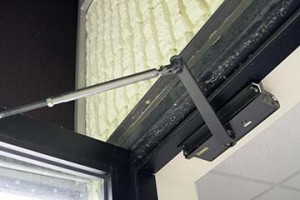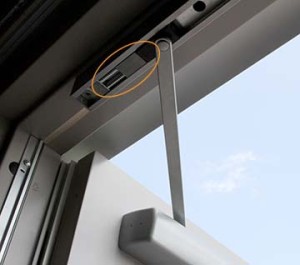 I feel like, as a whole, the door closer is a really under-appreciated piece of hardware. Without it, doors would be slamming all over the place and making lots of unnecessary racket. So I’m here to give you the lowdown on which door closer may be best for you.
I feel like, as a whole, the door closer is a really under-appreciated piece of hardware. Without it, doors would be slamming all over the place and making lots of unnecessary racket. So I’m here to give you the lowdown on which door closer may be best for you.
Door Closer Basics
The closer, which controls the swing of the door, is situated at the top corner of the door and can help keep a door from slamming shut. Door closers are required for fire-rated openings, ensuring the door is always in a secure position in the event of a fire. If it’s for an exterior door, a closer is going to also help with climate control by pulling the door closed when not in use (not to mention preventing doors from slamming on particularly windy days). Along with keeping your facility cooler or warmer, door closers will also help you keep those pesky utility bills low.
Light Duty vs. Heavy Duty Door Closers
Whether you select a light-duty or heavy-duty door closer is dependent on the opening you need to fit. Simply put, you should never use a light duty door closer on an exterior door; they aren’t made to withstand the force of high winds. If your facility is in a windy area and you use a light-duty closer, you’re likely to experience issues such as broken closers, door and frame damage, misaligned hinges, warped doors, shattered glass, slamming doors, and more.
Heavy duty door closers are made for tougher environments. Granted, they are more expensive, but the amount you save in the long run more than makes up for it. Heavy duty door closers are made to hold up under extreme conditions and high abuse.
Dead Stops
A dead stop absorbs the impact from the door arm and prevents the door from opening any further. It protects the closer arm from opening past the designated opening angle, keeping the arms and all other working components intact. You have a couple of options when it comes to dead stops.
Spring Assisted Dead Stop
With the spring assisted dead stop, the arm hits a spring that slowly absorbs the impact. The amount of force exerted onto the arm is decreased if the door ever happens to be blown open.
Bumper Dead Stop
The bumper dead stop is the most common type of dead stop used. When the arm hits it, the door will not open any further. These generally don’t work well on a light duty door closer; even with the bumper dead stop, a light duty door closer wouldn’t be able to handle the force of strong winds, and the door closer will eventually break.
As with almost all hardware, there’s quite a bit more to door closers than most people realize. They’re vital to keeping your door working in top condition, so make sure you have the appropriate door closers installed within your facility.
Have questions about a door closer? Aren’t sure what type of dead stop to use? Give us a shout. We’ll be more than happy to take your questions and explain them more in-depth!

One thought on “Door Closer Terminology”